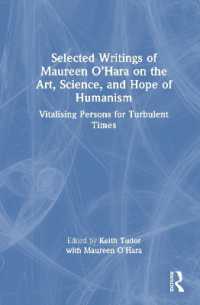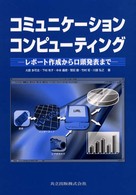基本説明
This two-volume set is the only comprehensive, current, authoritative text that focuses of how to create security policy in the framework of U.S. and international law. The main volume sheds light on these questions and on the general body of national security law. O'Neill further provides a supplementary volume that saves researchers from conducting hours of work online and in other, less comprehensive print resources.
Full Description
What are the legal limits for America's global war on terrorism?
The main volume of the set sheds light on these questions and on the general body of national security law as well as analyzes the legal foundation for international arms control in light of the global war on terror. O'Neill also provides a supplementary volume that saves researchers from conducting hours of work online and in other, less comprehensive print resources. Speaking from the unique viewpoint of his decades of experience in international law and political consulting, O'Neill has arranged a thorough, but compact resource for creating effective and principled security policy. National Security and the Legal Process offers readers a practical approach to resolving the age-old tensions between security and freedom and between self-defense and respect for sovereignty.
About this Volume
In this two-volume set, attorney and professor Philip O'Neill uses his vast expertise to explore the difficult legal principles that relate to U.S. conduct in its War on Terror. Instead of taking a simplistic, polemical approach to the debate between the imperative of security and the imperative of liberty, O'Neill instead advocates a more practical, process-based model for resolving that classic tension. O'Neill objectively provides the information and insight necessary to understand and improve current U.S. security policy. National Security and the Legal Process moves beyond the narrow debate between security assurance and civil liberties to analyze the legal implications of recent U.S. and U.N. action on issues such as bioterrorism and nuclear threats. With a detailed discussion of how best to address those two modern threats, National Security and the Legal Process acts as a comprehensive resource for policymakers and for the scholars and who influence them. The supplement of primary documents that accompanies O'Neill's monograph will remove hours of unnecessary research for practitioners as well as the next generation of policymakers: who include students enrolled in law schools and graduate programs.
Contents
A. (FOR THE MAIN TEXT) I "THE QUEST FOR PRINCIPLES OF ACTION IN AN AGE OF INSECURITY" II "WHEN PUSH COMES TO SHOVE" 1. PANDORA'S BOX: INTERVENTION AND THE USE OF FORCE 2. BEYOND INTERVENTION 3. GOING TO WAR III ; "21ST CENTURY ISSUES" 1. INTELLIGENCE 2. MILITARY ISSUES 3. DETENTION PRACTICES 4. TERROR FINANCE IV "ARMS CONTROL AND THE LEGAL PROCESS" 1. INTRODUCTION - LEGAL TECHNIQUES IN CHANGING CIRCUMSTANCES ; 2. EXAMPLE MODIFICATION TECHNIQUES TO ACCOMMODATE CHANGE 3. THE LEGAL LIMITATION OF WMD 4. WEAPONS IN SPACE 5. FLEXIBILITY IN THE ARMS CONTROL LEGAL PROCESS 6. PROLIFERATION CASE STUDIES V "OUR CHOICE" APPENDIX ; B. (FOR THE SUPPLEMENT): SECTION I. THE EVOLVING SCOPE OF NATIONAL SECURITY A. HISTORICAL B. CURRENT SECTION II. MULTILATERAL AND RELATED BILATERAL MATERIALS ; A. U.N. B. BILATERAL SECTION III. DOMESTIC U.S. AUTHORITIES A. EXECUTIVE ORDERS B. STATUTES AND RESOLUTIONS SECTION IV. COURT DECISIONS A. CASE CONCERNING NICARAGUA ; B. HAMDAN V. RUMSFELD (2006) AND RUMSFELD V. PADILLA (2004) SECTION V. MISCELLANEOUS A. PRESIDENTIAL STATEMENTS B. MEMORANDA OF UNDERSTANDING AND AGREEMENTS BETWEEN US AND USSR C. GUIDELINES D. OTHER DOCUMENTS








